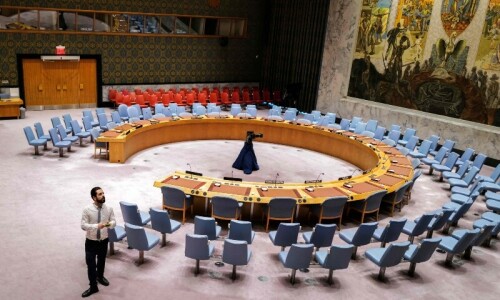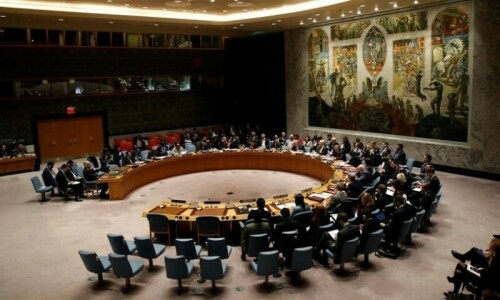In a critical development, the United Nations Security Council (UNSC) is poised to gather in New York today to vote on an updated resolution addressing the ongoing conflict in Gaza.
Following a week of intense closed-door negotiations, ambassadors from the 15-member Security Council continued discussions into Thursday evening, focusing on a draft resolution put forth by the United Arab Emirates (UAE).
The proposed resolution, initially drafted by the UAE, underscores the urgent need for measures to ensure the safe and unimpeded delivery of aid to civilians in the Gaza Strip. Notably, the United States has expressed support for the latest draft, contingent on the text remaining unchanged.
Ambassador Linda Thomas-Greenfield, representing the US, emerged from a closed-door meeting on Thursday evening and informed reporters, “We have worked hard and diligently over the course of the past week with the Emiratis, with others, with Egypt, to come up with a resolution that we can support. And we do have that resolution now. We’re ready to vote on it.”
She emphasised the resolution’s alignment with Egypt’s priority of establishing a mechanism to support humanitarian assistance.
To allow UN missions to consult their capitals, a decision was made to postpone the vote until Friday.
Earlier on Thursday, US National Security Council spokesman John Kirby revealed that President Joe Biden had been engaged in discussions with his national security team and officials representing the US and the UN regarding the resolution.
This diplomatic effort follows the US veto of the last draft on December 8, prompting swift action in the UN General Assembly just four days later. During that assembly, member states overwhelmingly voted in favor of an immediate humanitarian ceasefire through a non-binding resolution.
A key point of contention in previous sessions has been the US insistence that any resolution must condemn the attacks by Hamas on October 7, which triggered the escalation in the Palestine-Israel conflict.
In response, some countries critical of Israel’s offensive in Gaza have argued that any resolution condemning Hamas should also condemn the Israeli occupation and the civilian deaths resulting from Israel’s military actions.
Another stumbling block for diplomats negotiating the draft resolution has been the establishment of a UN monitoring mechanism tasked with independently assessing the effectiveness of aid delivery, free from influence by both Israeli and Hamas authorities in Gaza.
The updated draft resolution, now in circulation within the Security Council, remains a working document.
Key elements include Operative Paragraph (OP) 2, calling for “urgent steps to immediately allow safe and unhindered humanitarian access” and creating conditions for a sustainable cessation of hostilities.
It requests the UN secretary general to appoint a senior humanitarian and reconstruction coordinator responsible for facilitating, coordinating, monitoring, and verifying humanitarian relief consignments in Gaza.
The resolution also mandates that the coordinator will have the necessary personnel and equipment in Gaza, operating under UN authority. This move aims to expedite the delivery of humanitarian assistance to the civilian population in the Gaza Strip.
As the Security Council prepares for this pivotal vote, the international community remains divided on key issues, reflecting the complex geopolitical landscape surrounding the Israel-Palestine conflict.
The delicate balance of condemning specific actions while addressing broader concerns has proven challenging in past sessions, leading to deadlocks and, notably, the US veto in December.
The call for a UN monitoring mechanism underscores the need for impartial assessment and oversight in a region where conflicting narratives often cloud the humanitarian situation. Striking the right balance in the resolution is crucial to gaining broad support and ensuring effective aid delivery.
As the world watches, the Security Council faces the daunting task of bridging divides, finding common ground, and providing a diplomatic solution to the urgent humanitarian crisis in Gaza.
The outcome of Friday’s vote will not only shape the immediate response to the conflict but will also set the tone for future diplomatic efforts in the volatile region.














































Dear visitor, the comments section is undergoing an overhaul and will return soon.